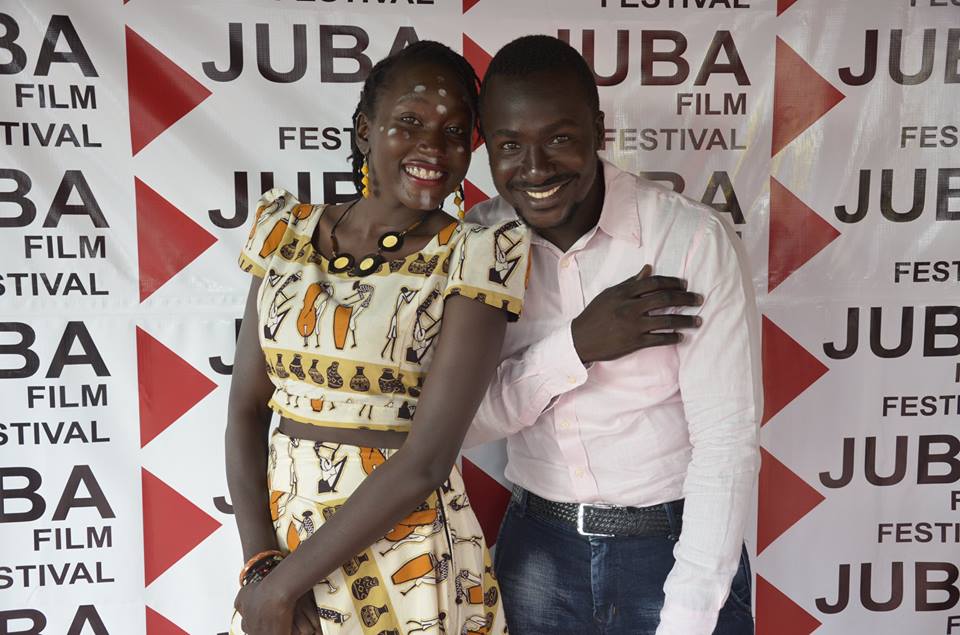The 2nd Juba Film Festival took place from September 4th – 9th, 2017. It was organized for the second consecutive year by Juba Film Festival initiative.
In this edition, there were more entries than in the first year and the quality and volume of submissions came not only from within South Sudan, but also from abroad, which indicates a bright future for the festival in the coming years. The festival opened the door for conversations about the industry and the marketing of films in South Sudan, along with the significance of cultural understanding in the film industry, and the value of films to South Sudanese producers and target audiences.
The second edition ended with the announcement of the winning film “Waja Ta Jana,” made by director Leviticus Levi who also won the award for Best Director for the same film. Upon receiving the award Levi commented that the awards his film won were a big challenge for himself and his team to maintain a high level of production. Leviticus Levi began his conversation with me recalling the difficulties the crew faced in the production of his winning film, noting the lack of understanding he faced within the Meridi community about the importance of the film and unwillingness to allow filming in their homes. He also mentioned the difficulties of filming although the Ministry of Culture, Youth, and Sports eased the task by providing an approval of filming, required by the authorities in the state of Meridi. Levi added that they also faced the difficulty of moving from one location to the next, but in the end they overcame the obstacle of having little resources in order to qualify for submitting the final product to the Juba Film Festival- their primary goal. Levi went on to say, “we are happy that the film ‘Waja Ta Jana’ won the best film award, we received the Best Director award, and we got the Best Script Award. It’s a large earning for us this year, and we consider these awards a challenge to us to work hard in order to defend our title in the next festival.” Then he added, “I think that the message of the film was very clear to the audience who watched it at the Nyakuron Cultural Center. We wanted to encourage young girls and boys towards education because the film deals with the issue of early marriage as one of the threats standing as an obstacle to the advancement and education of women in South Sudan. The film also shed light on the problems of alcohol addiction that leads to the fracturing of families.” 
 Image Credit: Juba Film Festival on Facebook
Image Credit: Juba Film Festival on Facebook
From another perspective Felipe Ofka, the secretary general of the Supiri High School Student Union that won the award for the first high school film said, “we are very happy with this win, and this is a great feeling to try to do something that other people enjoy and it helps change the mindsets of the community.” The story of the award winning film ‘Mara Batal’, which was made by the students of the school, aimed to send a clear message to mothers that there must be understanding between the father, the mother, and their children in order for the family to live in harmony because the refusal of the mother to provide a familial environment where love and care prevail is a disaster. Ofka said, “we think that ‘Mara’, who represents the character of the mother, is the main pillar of the family, and without her the family would collapse. If the mother begins yelling at home and does not welcome guests and argues with her husband about the schedule and refuses to prepare food for her children with the excuse that she is the one who works more in the house like we saw in the film ‘Mara Batal’, these events will lead to a deviation from human values and principles. So it is on our mothers to be the most present person for us the children, because we do not have anyone other than them in this life.” He also noted, “I want to take this moment to thank God first and thank the Juba Film Union for training us on how to create a film, write a scenario, and perfect the art of filming. I’d like to also thank them for encouraging us to continue until the opening moment of the festival.”
Actor Nyarsuk Patrick won the award for Best Actor this year and said candidly that there is a problem with the marketing of films and this aspect is important to improve the film industry in South Sudan. Patrick began jokingly, “if you wield a gun here, no one will stop you, but if you wield a video camera, you’ll find a group of people prohibiting you because they think that you want to send the footage to foreigners.” He also spoke about the difficulty that he faced in funding, because renting a camera and accessories is very expensive. At a practical level he added, “I never imagined that I would win the award for Best Actor in the festival because I am not better than the rest of my acting colleagues or the film producers that participated in the Festival. In these difficult circumstances we produce films, but we do not find the market for them. Even the audience does not help with that because they buy foreign films, yet expect that we should show our films for free; but it’s not reasonable. We want for our films to be promoted in South Sudan and any other place.” Patrick added that it is a nice feeling to win in any setting like this Festival, which brings together South Sudanese people to promote filmmaking, a mission that will require a large effort to maintain in the coming year.
Journalist Ibrahim Melik says that the idea to organize the festival every year is very important, and it is an important gate for the film industry in the country, noting that films play an important role in facilitating local issues in a smooth manner. He added, “I think that the awards are not enough for the production of a high-quality film at a time when a number of donors sponsor the festival, and because of that, the value of the award needs to be reviewed. It is not reasonable to give 300 USD to the best film while production costs reach 1500 USD. It is not logical and it’s a serious issue, because the films that won some of the awards have large artistic problems with the footage, script, and other things. This means that the ones who are picking the films are not experts in production and direction, and there is no well-known director among the selection committee. This should all be reviewed for the sake of development and quality.”
As for actress and Festival organizing team member Joyce Jon, she revealed what was on her mind during the preparation days of the festival, stating that she wanted to thank God for the success of the festival. She added that the Festival’s budget was not set until June, but the diligence of the organizing team and ardent communications with donors were able to plug the remaining financial holes. Joyce also noticed that the value of awards decreased this year from the previous year, but there is still effort towards improvement and polishing film production in South Sudan. Jon indicated that two years of the Festival is enough for learning, thus for the next year the Festival will focus on film quality and the ability to innovate in an effective way. The organizers hope the screenwriters and producers will strive to produce films of the highest quality so as to submit them in international festivals. Joyce Jon commented that the festival team will work on bolstering training and qualifications in the coming months in order to enhance the standards of actors, screenwriters, cinematographers, producers, and directors so that the mistakes are not repeated. She expressed her gratitude for the participants of the Festival and added, “we also need to thank our audiences who won the award for their commitment to the Festival’s 6 days in Nyakuron Cultural Center. We consider their commitment a big supportive gesture to us as organizers, and would like to continue in the same spirit so that peace prevails within ourselves and then, our country.” With that, she concluded the second round of the Festival in pure spirits, ready to move forward towards the next year.
Learn more about the Festival through their website or Facebook page.
